The impending default on the IMF loans leaves Greece sliding towards an exit from the euro, with unforeseeable consequences for Europe's common currency project.

Greece closed its banks and imposed capital controls on Sunday to check the growing strains on its crippled financial system, bringing the prospect of being forced out of the euro into plain sight.
After bailout talks between the left wing government and foreign lenders broke down at the weekend, the European Central Bank froze vital funding support to Greece's banks, leaving Athens with little choice but to shut down the system to keep the banks from collapsing.
Banks will be closed and the stock market shut all week, and there will be a daily 60 euro limit on cash withdrawals from cash machines, which will reopen on Tuesday. Capital controls are likely to last for many months at least.
"The more calmly we deal with difficulties, the sooner we can overcome them and the milder their consequences will be," a sombre-looking Prime Minister Alexis Tsipras said in a televised address. He promised bank deposits would be safe and salaries paid.
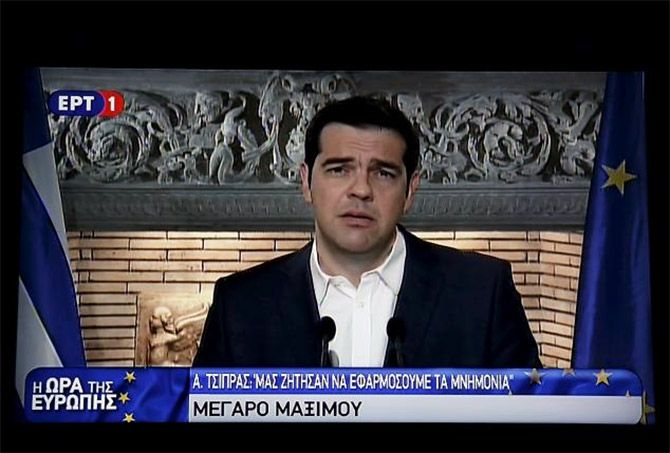
Even as Tsipras spoke late on Sunday, lines formed at petrol stations and the dwindling number of bank machines still holding cash, highlighting the scale of the disaster facing Greeks, who have endured more than six years of economic decline.
The failure to reach a deal with creditors leaves Greece set to default on 1.6 billion euros ($1.76 billion) of loans from the International Monetary Fund that fall due on Tuesday. Athens must also repay billions of euros to the European Central Bank in the coming months.
The impending default on the IMF loans leaves Greece sliding towards an exit from the euro, with unforeseeable consequences for Europe's common currency project. It also carries broad implications for the global financial system.
The euro fell almost 2 percent against the dollar in early Monday trade and share prices tumbled, while safe-haven U.S. government debt futures rallied.
The yen, which tends to gain at times of financial stress, strengthened against the dollar to a one-month high of 122.10. "We are in uncharted territory, and European equities, like all markets, will have a difficult time processing this," said Deutsche Bank Managing Director Nick Lawson.
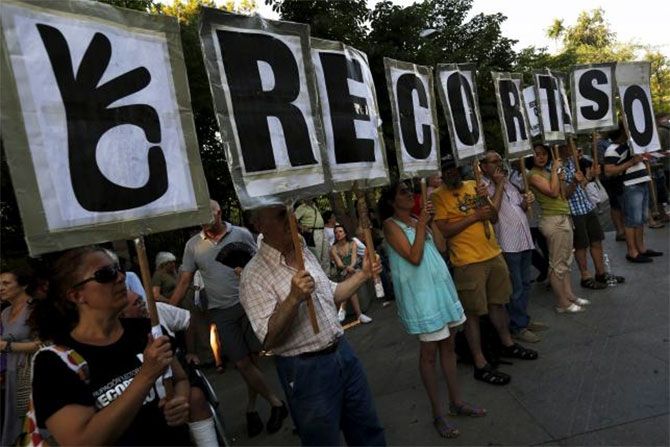
BLAME GAME
After months of wrangling, Greece's exasperated European partners have put the blame for the crisis squarely on Tsipras's shoulders. The 40-year-old premier caught them by surprise in the early hours of Saturday by rejecting the demands of lenders and calling a referendum on the bailout.
The creditors wanted Greece to cut pensions and raise taxes in ways that Tsipras has argued would deepen one of the worst economic crises of modern times in a country where a quarter of the workforce is already unemployed.
After announcing the referendum, Tsipras asked for an extension of Greece's existing bailout until after the July 5 vote. Euro zone officials refused, and in his televised address Tsipras branded the refusal an "unprecedented act".
Despite the hardening of positions, officials around Europe and the United States made a frantic round of calls and organised meetings to try to salvage the situation.
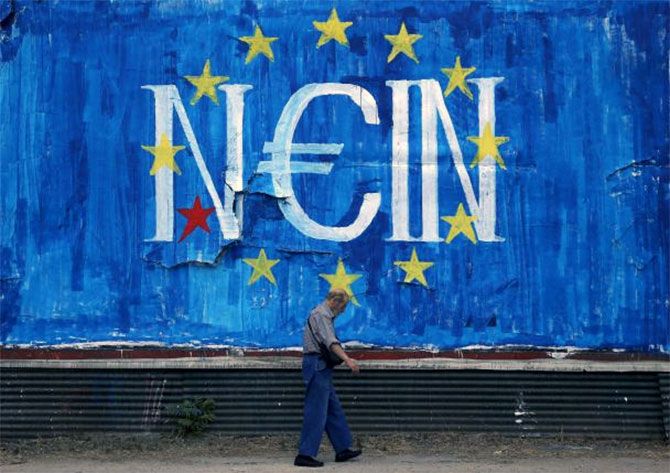
U.S. President Barack Obama called German Chancellor Angela Merkel, and senior U.S. officials including Treasury Secretary Jack Lew, who spoke to Tsipras, urged Europe and the IMF to come up with a plan to hold the single currency together and keep Greece in the euro zone. The German and French governments announced emergency political meetings.
French Prime Minister Manuel Valls urged the Greeks to come back to the negotiating table.
"I cannot resign myself to Greece leaving the euro zone ... We must find a solution," Valls told media.
In Asia, policymakers were watching events closely, though the spillover effects appeared limited for now.
Korea's finance ministry and central bank discussed the market reaction in meetings on Monday, while Japan's top government spokesman Yoshihide Suga said the government was in close co-operation with the Bank of Japan over the turmoil.
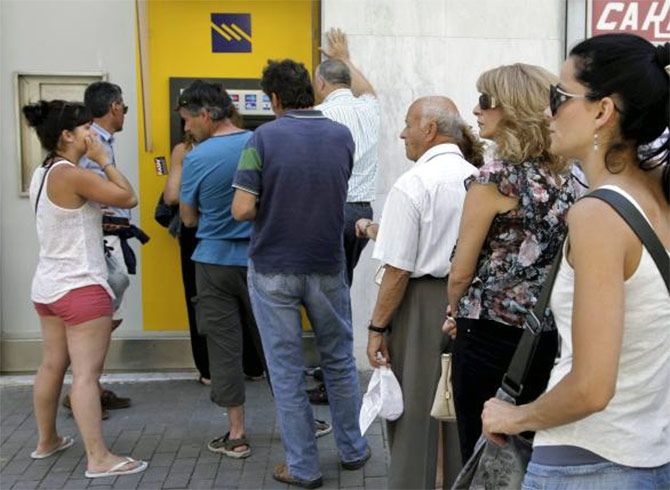
BILLIONS PULLED FROM ACCOUNTS
The bank holiday announced by Tsipras will last at least until Monday, July 6, the day after the planned referendum, a Greek official said after a late-night meeting of the cabinet. The Athens stock exchange will be closed as the government tries to manage the financial fallout.
It remains unclear how long capital controls will remain in force. In Cyprus, which imposed similar measures in 2013, they were not fully lifted until April this year.
Tsipras faces growing political pressure, with some opinion polls suggesting a majority of Greeks could turn their back on his call to reject the bailout and instead support the lenders' package in the referendum.
If they do, he would face pressure to resign, leaving the way open for new elections.
Former conservative Prime Minister Antonis Samaras, who on Sunday met Greek head of state President Prokopis Pavlopoulos, said Tsipras should drop the referendum plans and return to the negotiations or make way for a government of national unity.
As speculation of capital controls increased over the past two weeks, Greeks have pulled billions of euros from their accounts. Long queues formed in supermarkets on Saturday as shoppers stocked up on essentials.
Greece's top refiner, Hellenic Petroleum, said it had enough fuel reserves on hand to last for many months, but there were reports of long queues forming at petrol stations.
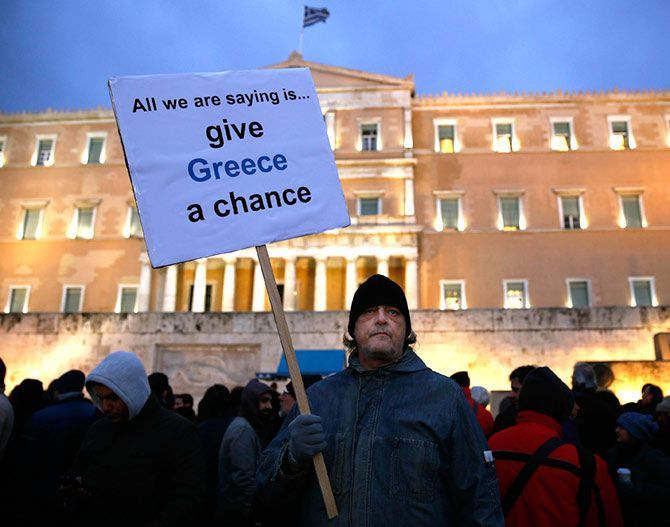
The broader consequences for Greece's economy, now back in recession, are likely to be severe, with the tourism sector, which accounts for almost a fifth of economic output, about to start its vital summer season. Anxious to reassure tourists, the government said the 60 euro cash withdrawal limit would not apply to people using foreign credit or debit cards.
Travel companies had been warning tourists for weeks that they should take extra cash, but finding empty ATMs was still a shock to many.
"I am trying to go over to the bigger banks," said Cassandra Preston, a Canadian tourist who was scouring central Athens for a machine with cash. "I am here for another month, and I would like to make sure I have some cash on me."
Many leading economists have voiced sympathy with the Greek government's argument that further cuts in spending risk choking off the growth that would give Greece some prospect of servicing debts worth nearly twice its annual national income.
However, in economic powerhouse Germany, other southern states that have endured austerity in return for EU cash and poor eastern countries with living standards much lower than Greece's, many voters and politicians have run out of patience.
German Finance Minister Wolfgang Schaeuble openly questioned the solvency of Greek banks, a key condition to qualify to receive such finance.
"The ECB has always said that as long as Greek banks are solvent, then emergency loans, the ELA, can be granted," he said on Saturday. "And now there is naturally a new situation that because of the developments the liquidity and solvency of Greek banks, or some Greek banks, could be in doubt."
(Additional reporting by Deepa Babington, George Georgiopoulos, Karolina Tagaris, Michele Kambas, Lefteris Karagiannopoulos, Matthias Williams in Athens)
($1 = 0.9078 euros)











